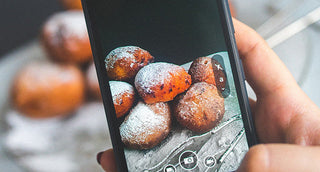If you’ve spent the last hour aggressively scrolling through insta-perfect images of all things foodporn-esque trying to decipher which meal to demolish on your next gastronomic endeavour, you’re not alone... ‘Foodstagramming’, or social media’s way of revealing your inner culinary eye, has become one of its most ubiquitous trends. At the time of writing there was over 104,190,242 posts using #foodporn on instagram alone, not to mention everything else out there on twitter, facebook, snapchat, reddit and more... To give you an idea of just how many that is, a survey conducted in 2013 found that over 90 new photos with this same hashtag were uploaded every minute — or 1.5 every second!

Now if you’ve been living under a rock this whole time, #foodporn is a saying commonly associated with delivering visually appealing foods. The term, credited to Michael Jacobson, the co-founder of the Centre for Science in the Public Interest, can be described as ‘
food that is so sensationally out of bounds it deserves to be considered pornographic’. But while some may happily like and drool over their feeds without reaching for the closest indulgent treat, experts have warned that negative health consequences may result from this overexposure of indulgent foods.
Research suggests that exposure to highly palatable food can chronically activate our desire to eat, even in the absence of physiological hunger. A separate review has also highlighted that appetising food images may inhibit cognitive processes such as self-restraint, making it even more difficult for people to not overeat. These studies are however limited to various types of people, with overweight participants more susceptible to heightened responses. For example,
Ouwehand & Papies found that when overweight participants were primed with ‘tempting food’ or neutral food objects their desire for high calorie foods increased. In line with this, another study found that for those who were watching their weight had lower appeal to immediately satisfying temptations and therefore more likely to pursue healthy eating behaviours.

So what can you do? Well if some of these behaviour patterns seem all too familiar, and this is something you want to change, it might be time to unfollow a few of the worst offenders, put your phone down and get outside to clear your mind.




